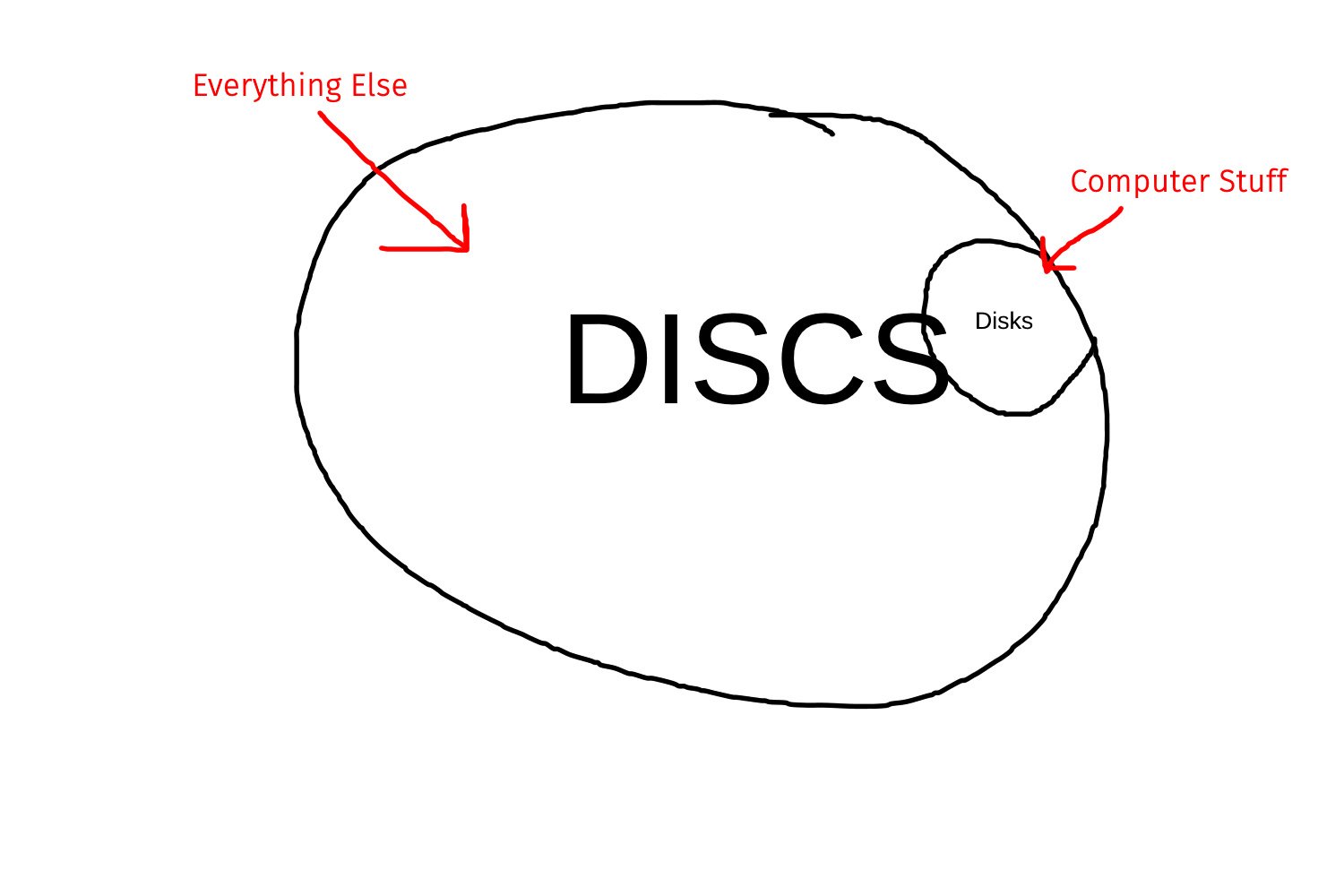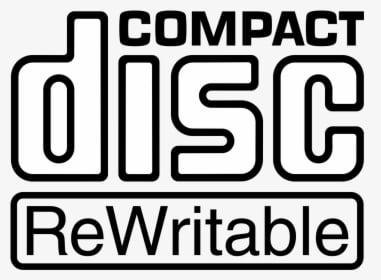I heard some people say theyre the same thing, but others are adamant that they have different meanings. Which is it?
Disk is for things that are more kiki, but disc, with that rounded off c, is for things that are more bouba.
IYKYK.
What about disq?
And what is Lemmy?
Disc and disk are varient spellings of the same word that pre-exist computing. Disc is more common in British English, Disk more common in American English. But yeah since computing came along disk has also been used more for magnetic media (hard disk) while disc has been used more for optical media (compact disc). I wouldn’t be surprised if this only happened because of how the CD was marketed and branded as a “compact disc” as a trademark while hard disks and floppy disks etc were more generic terms.
In modern parlance, this has been my working understanding too:
But yeah since computing came along disk has also been used more for magnetic media (hard disk) while disc has been used more for optical media (compact disc).
Optical:
- compact disc
- laser disc
Magnetic:
- 3.5" diskette
- 800GB hard disk drive
…and just to point out there is some disagreement
Magneto-Optical , such as Sony MiniDisc, is sometimes referred to Disc for its optical properties and sometimes as a MO Disk for its magnetic properties.
Bloody English spelling… There’s a reason spelling bees don’t exist in some other languages.
We have a competition for spelling because English spelling is so bad at its job.
I’ve always known disc to refer specifically to optical media.
Disque
Diskette
Petit Disk
Its a disk when its magnetic, disc when optical.
The way to remember it is that its disk because its magnetik.
What if it’s optikal?
I cannot stress enough how efficiently you ruined my ability to use the memory trick.
Is a VHS tape a disk then?
No, that’s a tape. It has to be dis(c/k) shaped to be a disk.
the tape spooled up on the reel inside a VHS looks like a thi(c/k) dis(c/k)
thic(k/c)
more disk shaped than flash memory.
Is a plate optical or magnetic?
Depends on how you store data on it. If you write with a pen its optical.
I usually store food on them
So… neither?
No a disc is round
ur a disc
But what if it’s magnetic?
As others have said and how I always see it:
- Discs are small, circular, flat objects, e.g. the discus;
- Disks are discs used for computer stuff, e.g. floppy disk(ettes), CD-ROMs, DVD-ROMs, hard disks, and so forth…
In other words, all disks are discs, but not all discs are disks.
Here’s a shitty drawing I made to illustrate:

But…

I was wondering how CD-RW works, if anyone else wants to know:
https://electronics.howstuffworks.com/question655.htm
They have a layer that can change between clear and opaque that is changed by having different temperatures applied to it.
upvoted for your spiffy drawing, although i don’t agree with it
Lol, thanks.
What about my distinction do you disagree with, though?
I don’t think the differentiation makes any sense at all.
edit: to clarify-- this isn’t a criticism of the op’s sketch; i just don’t think any attempt makes sense
my attempt to simplify the above explanation; -disc =round -disk =storage
Storage can be round but not all round things are storage
But that doesn’t cover the round storage we call compact discs. It’s just nonsensical
I mean to me compact disc sounds like small and round. Just happens to also be storage media 🤷♂️
There’s nothing wrong with over thinking a shitpost, right?
Does not make send but it is true though.
Computer usage doesn’t determine that you spell it with a k.
A disk is indeed short for diskette, and disc is short for discus.
However, you can absolutely use a compact disc on a computer.
And while there are typically spinning platters or spinning magnetic strips inside hard drive disks or floppy disks, they are referred to by the whole unit as a logical disk drive that you’d see in computer.
If it’s possible to find them all now, you’d see that DVDs, CDs, Blu-ray, laserdisc, are all spelled like discus. 3.5, 4.5 floppy disks, hard drives, solid state drives, tape drives, etc all spell it disk.
So for the most part, being purely observational, you can see that anything shaped like a frisbee with a hole in it will be a disc, and everything else is a disk.
I think that’s slightly different than your explanation, as the terms are mutually exclusive.
You have to put a segment of “disk” outside of the “disc” set on that Venn diagram. You are forgetting about solid state disks.
Disc = round
Disk = rectangular
Well…That almost makes it too simple.
What about hard disk drives. The “disks” inside them are round
The hard disk is made with discs.
At its root this was originally a British vs. American English thing. However, the spelling of “disc” with a C has been used specifically as the trade name of various brands including both the throwable and optical media varieties, which have since become genericized trademarks.
For the optical media side of things, the name was coined by Phillips while they were consorting with Sony to develop the standard and named it the “Compact Disc” to compliment their already existing “Compact Cassette” product. They developed an official logo for the format which spelled it “disc.” That’s been with us ever since.
Volumes of computer storage are now colloquially referred to as “disks” because A) a significant majority of the early computer development milieu in general happened in America where we, or at least IBM, spell it with a K, and B) for a very long time, that’s exactly what they were. Tape and magnetic core memory and wire loop memory were all early developments that ultimately gave way to the longstanding popularity of magnetic platter/disk fixed storage… With some exception granted to tape, which hung around for a very long time but definitely was not a random access storage medium suitable for general purpose applications whereas disks were. It’s probably pure happenstance that the dominant non-fixed computer storage media also wound up being disk shaped, namely the various sizes and types of floppy disks. Computers handle linear tape based storage and random access disk based storage very differently, and nowadays random access permanent storage still has the “disk” moniker stuck to it even though it’s now likely to be solid state.
As a generalized descriptor of a flat circular object, either “disk” or “disc” is appropriate but which is preferred seems to be largely depending on which continent you’re from. The root of the word is indeed the Greek “discus,” as in the object yeeted across the playing field by Olympic contestants.
I am not sure, but my oldest child was looking at an English brochure for a trip to France and a asked me "what the heck is a dis-coth-a-cue? Discotheque. A Disco, a dance club. And yes disco-tek is spelled Discotheque in English.
Not in America it ain’t. Here it’s spelled “Disco is dead.”
I always thought discs were optical and disks were magnetic
A disk drive reading disc’s would be a disc disk drive
And if it reads 70s music records, it could be a disc disk disco drive!
disc disk
Got ‘em!
deleted by creator
The reason for this is actually pretty interesting though. Historically it was just a US/UK English difference, but it evolved into both being used because one of the first big manufacturers of optical discs, Philips, called them discs, while the US-based IBM spelled their magnetic disks with a K.
You’ve exceeded my “learning cool stuff” limit today. Thank you. Now I can’t retain any other information.
In systems we consider discs to be optical devices and sometimes just lump any portable media as a “disc”
Once it’s on my system and seen as a device is becomes a
diskDisck
Perhaps it’s just a leftover marketing motif?
"The spelling disk and disc are used interchangeably except where trademarks preclude one usage, e.g., the Compact Disc logo. The choice of a particular form is frequently historical, as in IBM’s usage of the disk form beginning in 1956 with the “IBM 350 disk storage unit”. "












